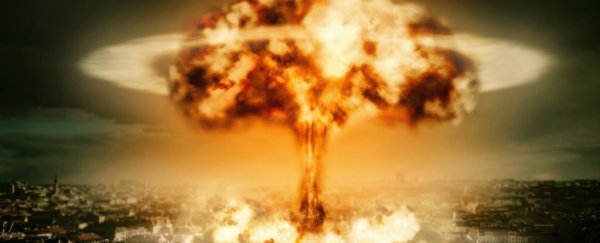| Topic: Global Catastrophic Report 2016 | |
|---|---|
|
Edited by
SassyEuro2
on
Mon 06/06/16 12:08 AM
|
|

New report officially ranks all the catastrophes that could wipe us out in 2016 The world's most pressing problems, according to science. PETER DOCKRILL 6 MAY 2016 http://www.sciencealert.com/new-report-ranks-the-global-catastrophic-risks-facing-the-planet-in-2016/ * Embedded Links* There's no such thing as a scale of all the bad things that could actually happen to you and me, but if there were, a 'global catastrophe' would have to rank pretty much near the top of it, no? These kinds of terrible happenings – defined as "events or processes that would lead to the deaths of approximately a tenth of the world's population, or have a comparable impact" – might only be hypothetical for now, but that doesn't mean we shouldn't be studying them, assessing their causes and risks, and trying our best to prevent them. Which is where the recently released Global Catastrophic Risks 2016 report comes in. Published by the Swedish Global Challenges Foundation in collaboration with the University of Oxford's Global Priorities Project, the report – updating last year's similarly gloomy assessment – outlines the key risk factors that could seriously threaten our way of life on the planet. Sure, it might sound like something from a disaster movie – and Hollywood mines this very territory every year for its blockbusters – but global catastrophes really do occur, although not in particularly recent world history (for which we should be grateful). Examples include pandemics such as the Black Death, estimated to have killed as many as 200 million people (approximately 20 percent of the world's population) in the 14th century. More recently, the Spanish Flu in 1918 is estimated to have killed between 3–5 percent of the world's population (technically not a global catastrophe per the above definition, but near enough). And the Cuban Missile Crisis, had things worsened, could have wiped out significantly more than just 10 percent of the world's peoples. So what are the global catastrophes we're most at risk from now? According to the report, the most likely high-risk global catastrophic events that could occur in the next five years are pandemics – either natural, or engineered by humans – and the prospect of nuclear war. Other high-risk threats – but ones considered less likely to wreak havoc in the next five years – are catastrophic climate change, catastrophic disruption from artificial intelligence (AI), and the potential failure of geo-engineering, which refers to how our attempts to address climate change via things like carbon sequestration could end up backfiring. Low-risk threats include external events like the chance of an asteroid impact or a super-volcanic eruption, and "unknown risks", as the report explains: "Indeed, experience over the last century suggests that many of the most important future risks may be at present unknown. Just as in the early 20th century it would have been impossible to predict nuclear weapons, catastrophic climate change, or bio-technology risks, it may be that many of the future leading global catastrophic risks are not yet within sight." Importantly, the report doesn't just outline these risks, it also contains advice on how humanity might be able to prevent these catastrophes from occurring. These are mainly things for governments, NGOs, and research organisations to take on board, but it couldn't hurt to take a look yourself. The one thing we can't afford to do is ignore them: "Despite their scale, the risks of global catastrophes receive limited attention. One reason is that many of these risks are unlikely in any given decade. But even when the probability is low, the sheer magnitude of an adverse outcome warrants taking these risks seriously. A global catastrophic risk not only threatens everyone alive today, but also future generations. Reducing these risks is therefore both a global and an inter-generational public good." If you want to find out more, be sure to check out the full report. It's a fascinating, sobering analysis of the kinds of dangers humanity really needs to be aware of – although probably not something to read right before going to bed. You've been warned! Oh, and there's no word on the threat of zombie apocalypses in the report this year, but scientists are on the case… ------------------------------------------------------- http://www.dailymail.co.uk/sciencetech/article-3563204/Robots-nuclear-war-climate-change-list-catastrophic-threats-facing-humanity-2016.html/ -------------------------------------------------- A global catastrophic risk is a hypothetical future event that has the potential to damage human well-being on a global scale.[2] Some events could cripple or destroy modern civilization. Any event that could cause human extinction is also known as an existential risk.[3] Potential global catastrophic risks include but are not limited to hostile artificial intelligence, nanotechnology weapons, climate change, nuclear warfare, total war and pandemics. Researchers experience difficulty in studying near human extinction directly, since humanity has never been destroyed before.[4] While this does not mean that it will not be in the future, it does make modelling existential risks difficult, due in part to survivorship bias. 
Artist's impression of a major asteroid impact. An asteroid with an impact strength of a billion atomic bombs may have caused the extinction of the dinosaurs [1] http://en.m.wikipedia.org/wiki/Global_catastrophic_risk/ Global Catastrophic Institute http://gcrinstitute.org/ |
|
|
|
|
|
Mohenjo Daro and Harappa in the Indus Valley!
|
|
|
|
|
|
Katy Perry's love life?
|
|
|
|
|
|
Justin Beibers new haircut?
|
|
|
|
|
|
Justin Beibers new haircut? 
|
|
|
|
|










